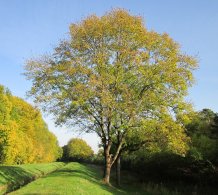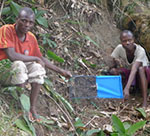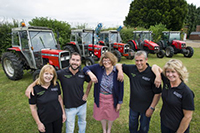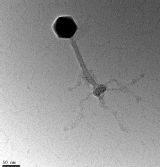Departmental news
Foot-and-mouth crises to be averted with vaccination strategy
 Research by Dr Mike Tildesley and colleagues shows foot-and-mouth epidemics could be controlled quickly and effectively by rapidly establishing how many animals can be vaccinated per day of an outbreak.
Research by Dr Mike Tildesley and colleagues shows foot-and-mouth epidemics could be controlled quickly and effectively by rapidly establishing how many animals can be vaccinated per day of an outbreak.
Read Press Release
Ash dieback: Insect threat to fungus-resistant trees
 Ash trees which can resist the killer dieback fungus may be more vulnerable to attacks by insects, according to new research.
Ash trees which can resist the killer dieback fungus may be more vulnerable to attacks by insects, according to new research.
Scientists from the universities of Exeter and Warwick examined trees which are resistant to ash dieback and – unexpectedly – found they had very low levels of chemicals which defend against insects.
With efforts under way to protect ash trees from dieback, the scientists warn that selecting trees for fungal resistance could put them at risk from insects.
Deadly sleeping sickness set to be eliminated in six years
 Gambian sleeping sickness – a deadly parasitic disease spread by tsetse flies - could be eliminated in six years in key regions in the Democratic Republic of Congo (DRC), according to new research by the University of Warwick.
Gambian sleeping sickness – a deadly parasitic disease spread by tsetse flies - could be eliminated in six years in key regions in the Democratic Republic of Congo (DRC), according to new research by the University of Warwick.
Kat Rock and Matt Keeling at the School of Life Sciences, with colleagues in DRC and the Liverpool School of Tropical Medicine, have calculated the impact of different intervention strategies on the population dynamics of tsetse flies and humans - establishing which strategies show the most promise to control and eliminate the disease.
Christmas dinner saved! Sprouts gain natural disease defence
 Professor John Walsh’s group at the School of Life Sciences, Wellesbourne campus, has discovered natural plant genes that will make sprouts resistant to two of the biggest threats they face: Turnip mosaic virus and Turnip yellows virus.
Professor John Walsh’s group at the School of Life Sciences, Wellesbourne campus, has discovered natural plant genes that will make sprouts resistant to two of the biggest threats they face: Turnip mosaic virus and Turnip yellows virus.
Warwick and Waitrose tackle global food security together
Food security is at the heart of a new doctoral training collaboration between the University of Warwick and Waitrose, thanks to an award from the Biotechnology and Biological Sciences Research Council (BBSRC).
Warwick will work with Waitrose and their suppliers, to provide PhD students with a unique combination of academic development and industry training in the field of agriculture and sustainable crop production.
New study identifies scope for more innovation in horticulture
A unique study has taken a thoughtful approach to understand why parts of the horticulture industry do not take up some of the innovative ideas that emerge from universities and research institutes, as well as other areas of the industry. The study has been undertaken by PhD student Jonathan Menary from Warwick Crop Centre, part of the School of Life Sciences.
Behind-the-scenes access at Warwick’s life sciences labs
 Scientific laboratories at the University of Warwick are once again being opened up to members of the public – giving YOU behind-the-scenes access to cutting-edge research happening in Coventry.
Scientific laboratories at the University of Warwick are once again being opened up to members of the public – giving YOU behind-the-scenes access to cutting-edge research happening in Coventry.
Over the next year, the School of Life Sciences is running a series of open events, allowing the local community to come along and find out how the natural world works – from our superbrains to superbugs!
The next event, ‘Getting to grips with antibiotic resistance’, will explore the international threat of antimicrobial drug-resistant bacteria – which are predicted to kill more people than cancer by 2050.
Warwick Crop Centre Joins Historic Tractor Parade
 Staff and students from Warwick Crop Centre took part in the ‘70 tractors for 70 years’ Massey Ferguson procession organised by Coventry Transport Museum on Saturday 30 July.
Staff and students from Warwick Crop Centre took part in the ‘70 tractors for 70 years’ Massey Ferguson procession organised by Coventry Transport Museum on Saturday 30 July.
How viruses might influence estimates of global warming
 The tiniest life forms on Earth have a big impact on the way carbon dioxide is cycled between the atmosphere and the ocean, new research from the University of Warwick has found.
The tiniest life forms on Earth have a big impact on the way carbon dioxide is cycled between the atmosphere and the ocean, new research from the University of Warwick has found.
These life forms are viruses of some of the most abundant organisms on our planet: marine cyanobacteria.
The new research, Viruses Inhibit CO2 Fixation in the Most Abundant Phototrophs on Earth and published by Current Biology, demonstrates that the viruses of these cyanobacteria, cyanophages, use these genes to maintain the so-called “light-reactions” of photosynthesis, while shutting down the “dark-reactions”.
Cyanobacteria have had an incredible impact on the Earth by seeding the atmosphere with oxygen about 3 billion years ago, allowing for the existence of life as we know it. Today, this same process that acts to produce oxygen sucks up CO2 from the atmosphere.
Professor David Scanlan of the University of Warwick’s School of Life Sciences, the lead author of the research, said: “CO2 is a key greenhouse gas directly implicated in global warming. Given CO2 is converted into organic compounds during photosynthesis, factors that directly affect this process play a key role in modulating atmospheric CO2 levels.”
“We have known about these viruses for several decades” said Scanlan. “Things changed in 2003 when we discovered that these viruses have stolen genes from cyanobacteria that participate in photosynthesis. Now we have shown that these viruses modify photosynthesis during the demise of their host”.
On a global scale this results in losses of 0.02-5.39 Pg C yr-1 to viral induced inhibition of CO2 fixation. Per annum this upper figure is approximately 10% of the total CO2 fixed in the marine environment.
This data has important implications for measuring greenhouse gasses. Professor Scanlan explains:
“Quantification of net primary productivity is usually determined by directly measuring cyanobacterial photosynthesis and these methods rely on the coupling of light reactions to CO2 fixation”.
“In virus infected cells, this assumption of light reactions linked to CO2 fixation is incorrect and can therefore lead to a significant over estimation of CO2 fixation. This has very important implications for our understanding, and the estimates of, global warming.”
Contacts:
Professor Dave Scanlan
Email:
Tel: + 44 24 76 528363
Dr Andrew Millard
Email: Andrew.Millard@warwick.ac.uk
Tel: + 44 24 76 523589
Plants remember stress to help protect themselves
A new generation of plants better adapted to mitigate the effects of environmental change could be created following a fundamental step towards understanding how plants are able to retain a memory of stress exposure.
The research, led by Dr Jose Gutierrez-Marcos and published in the journal eLife, provides the first compelling evidence that plants have evolved ways to remember previous exposures to stress, in this case high salinity conditions, which can help subsequent progenies withstand the same stress in future.
